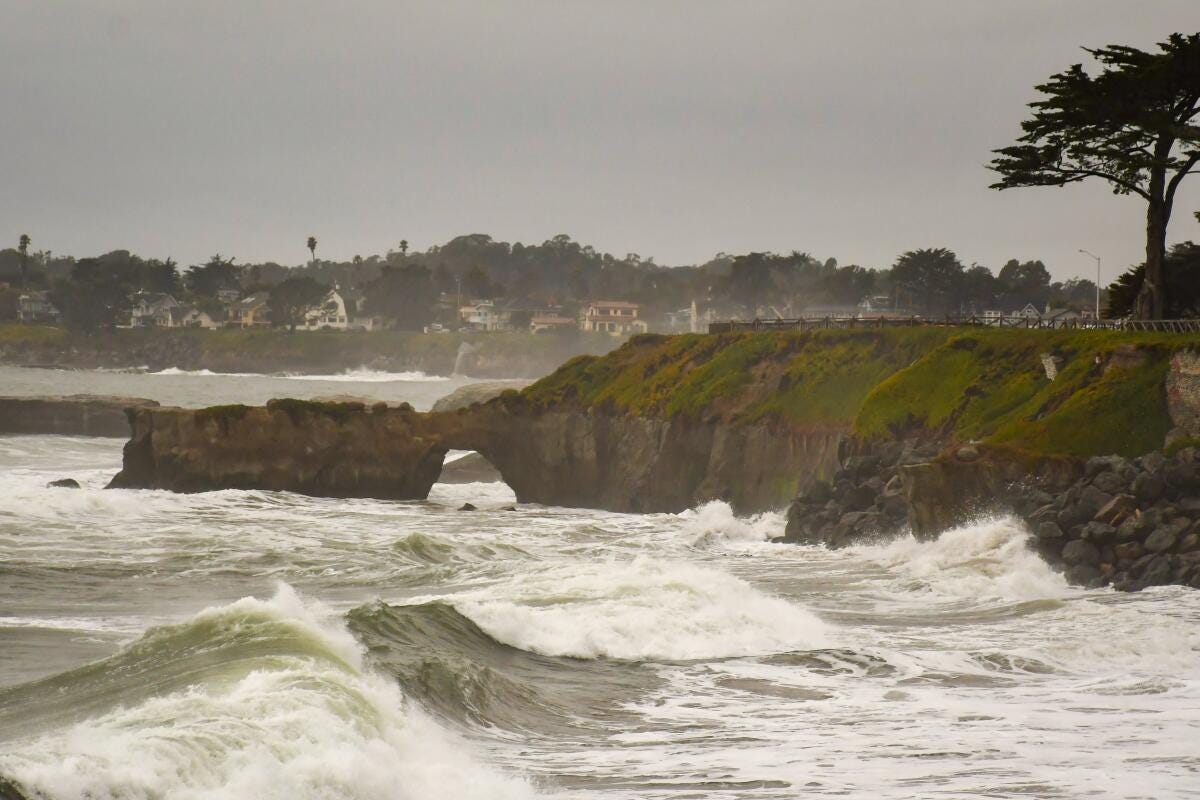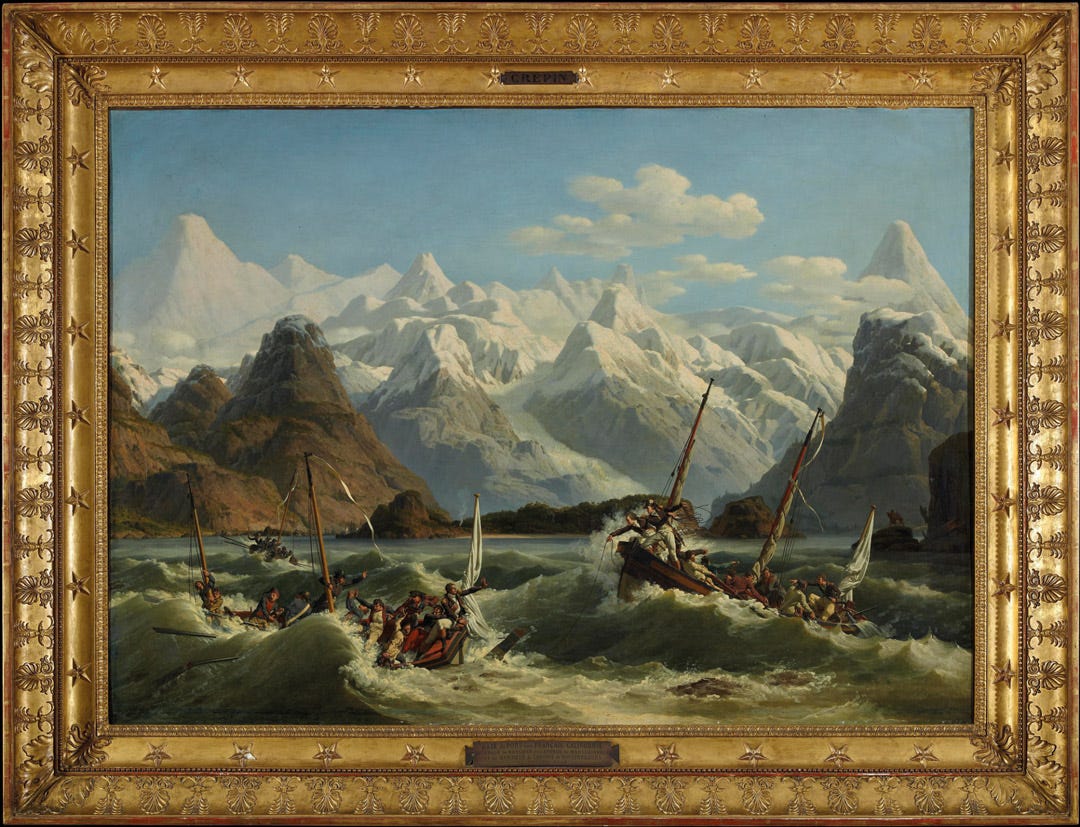“It was a tumultuous scene, with the men and women moving through the rooms like a wave.”
-The Great Gatsby
Every time I hear or read the word tumultuous, I think of the sea. In the standard definition, it implies noise, but to me it means the unpredictable disorder of a wild ocean expanse, darkened by a storm, white-tips crashing in and out of one another. It feels brash and lonely, as if I’m alone and it will all end soon if I can’t make it through.
The secondary definitions are a bit more in line with what the word means to me. Disorderly or chaotic situations or, in my history with it, emotionally intense or agitated states.
I first learned the word when, at age eighteen, I received it in a break-up email from a woman I was in love with. I read the email on a communal computer at a hostel in Prague during a dark, absinthe-fueled winter, after a chaotic year when I had dropped out of high school and resolved to travel as much as possible. She described our relationship, strained by absence, as tumultuous. I had to employ my older, smarter, friend Benjamin at the time to clarify what this email meant and the word. Ben came and read the email, frowned as he usually did at everything, and nodded that he understood.
“Like the sea,” he said, “that’s what that means.”
As I reread the email with that definition in mind, I let my eyes rock over the vowels and consonants in the word. It felt like being on a ship. The bob of “Tum”, the splash of “tuous”, I felt it settle in my mind for good.
Ben and I sat around rolling cigarettes and memorizing poetry as we let the dark days of the winter pass by. We splurged and bought a giant tub of tobacco and a pack of rolling papers, fashioning ourselves as exemplary and thrifty hobos. Neither of us had plans. Ben had dropped out of college, and I had no intention of getting a higher education. We traded Russian literature books and tried to find the cheapest Czech beer to get drunk on. Time felt slow and choppy all at once. I had yet to experience true tumult as an 18-year-old child, though I liked to pretend that I had.
When the world around you gets tumultuous, as it seems lately with the military in Los Angeles, it’s wise to remember that there can be no disorder without order to eventually compare it to. Order will come, and there is nothing that is not in relation to another thing. Disorder needs order for it to be. At least that is what we can hope.
My first love was tumultuous, it’s true. The first time I felt what anxiety was like was during an argument between us. Why was there a burning in my chest all of a sudden and a sense of dread? It felt like waves of poison rolling through me.
She was right to have described our relationship that way. It didn’t end there with that email. It was drawn out and painful for years afterwards. We lived together, fought, and broke up over and over. We had childlike sex and childish arguments because we were still children who didn’t understand anything about how to properly communicate. Lack of proper communication causes tumultuous times. We moved to Santa Cruz because Ben was there too, but we still fought. There was always a point in our fights that she would walk away from me and leave, for a few hours, sometimes a day. I would walk to the beach and watch the waves crash over each other in the ocean again and again. The piles of seaweed and trash, cooked by the sun, smelled sour in the sand next to me. I felt the burning anxiety rush up and down my spine.
And then, finally, it was done. I remember a moment when she walked away, and I could tell that it was the final time. We were only 21 years old. When we broke up, the anxiety remained, and eventually I had to go to therapy for help. It took a few years, but I learned to calm the tumult when it got too intense, with redirection and breathing techniques. A long, slow inhale could bring me out of my head. Redirecting negative thoughts over and over somehow worked after the thousandth time.
There are so many words that carry symbols within them that are uniquely ours. Do you picture the sea when you hear the word “tumultuous”? I wonder what sea yours is, and how choppy and wild it is in your mind. Who do you imagine with those words? That is a driving factor in this project for me, studying the words and examining the signifiers they represent in my consciousness. All of ours are different and unique, but carry a thread of similarity.
There is no platonic ideal of a tumultuous sea that isn’t your own. Mine comes from books and not any of the real oceans I have seen. I’ve been to many oceans and ridden on ships so far out I couldn’t see land, but none of those are accurate enough. I think mine comes from somewhere in my reader’s imagination in the middle of Moby Dick. A deep blue/black sea with jagged white caps that rocks the Pequod with tempestuous, Shakespearean winds. Or I think of the waves in the painting “Shipwreck off the Coast of Alaska,” by Louis-Phillipe Crépin, which I’ve stared at many times at the Seattle Art Museum, and wished I could hear its sounds and taste the salt of the crashing bay.
There have been years when I forgot what to do with the anxiety about myself and the world, and tried to drown it out with whatever substances I could get. But now I am much better at remembering to return to myself. I had plenty of bad relationships after that first one, and my self-care often wavered. Sometimes, that falling, poisonous feeling still comes up today when I think about the state of the world, what wars may start, what jobs there will be left, how hot the pavement is under the soles of my shoes, and I have to remember my breath and redirection. I’ll think of the first time I felt that emotion, and I try to smile and have empathy for the scared child that I was, playing house and trying my best.
When I calm the inner tumult, the outside chaos doesn’t disappear, but its edges are less sharp. Funnily enough, what I often picture when I try to calm this anxiety is a calm and expansive sea. And I remember that everything isn’t always tumultuous.




Inspiring